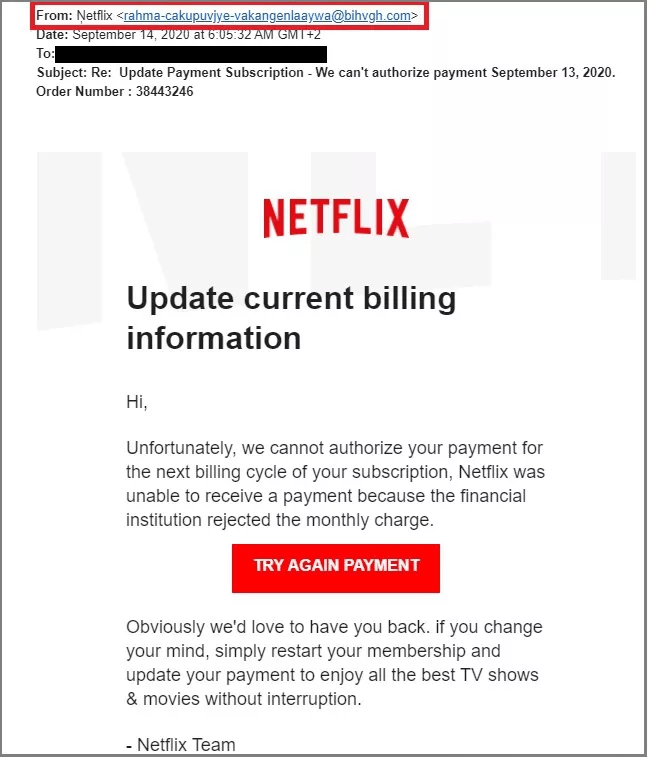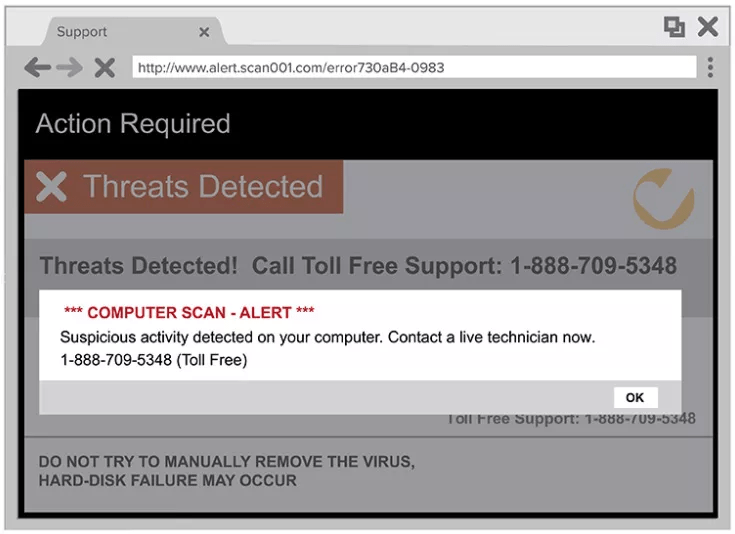Forgot Windows Login Password? Here’s How to Reset It Easily

.png)
The types of online fraud are always changing. Records-breaking losses from internet crimes were reported by the FBI in 2019 totaling $3.5 billion.
The likelihood is that a computer or mobile device close to you is currently being targeted by scammers all over the world. The most typical online scams are shown below, along with steps you can take to protect your identity and financial assets.
KEY LESSONS
Scammers now have more ways to trick consumers thanks to the COVID-19 pandemic.
Thousands of people are still taken advantage of every year by some of the most well-known scams, including the Nigerian letter scam, despite widespread warnings.
Change your passwords, remove any dubious software, and get in touch with the police if you believe you've been conned.
Apparently, Google "The surge in COVID-19 communications is being exploited by scammers, who mask their schemes as official COVID-19 mails. Scammers may also contact you via text messages, automated calls, and dangerous websites in addition to emails."
false healthcare institutions. Scammers use the World Health Organization (WHO) and the US Centers for Disease Control (CDC) as fronts to promote treatments, diagnostic procedures, and other COVID-19 material.
websites that market counterfeit goods. These websites sell popular items that never show up, such as face masks, hand sanitizer, disinfecting wipes, and others. Only purchase goods from reputable marketers.
fake sources from the government. These con artists make out that they are the Internal Revenue Service (IRS) or a regional tax body, issuing updates and payments on their behalf.
phoney financial propositions. With offers meant to steal your financial information, scammers may assume the identities of banks, debt collectors, or investors.
fake calls for donations to charities. To aid in disaster relief, many people choose to donate to humanitarian causes. Scammers can use this as a great opportunity to set up fictitious nonprofits, hospitals, and other organisations to raise money. Instead of clicking on a link you receive via email or text, make a donation directly through the website of a reputable nonprofit.
Whether it's a pandemic or a weather-related crisis, con artists also strike during these times. Scammers will take advantage of a tragedy or natural disaster to defraud you of your money while disguising themselves as a legitimate help agency. You unknowingly give credit card information or other e-payment information by believing you are making a donation to an emergency relief fund.
Donate only to reputable, well-established organisations. Before making a donation, check the legitimacy of any charitable organisation you are thinking about supporting on GuideStar or Charity Navigator.
You get an email that appears to be from a well-known company that you trust, like your bank, university, or favourite retailer. The message sends you to a website, typically to verify personal data like passwords and email addresses, where it steals your information and leaves your computer vulnerable to attack by scammers.
One of the most typical attacks on consumers is the phishing scam. In 2019, more than 114,700 people were duped by phishing schemes, according to the FBI. They lost around $500 each, or $57.8 million overall.
The Federal Trade Commission claims that stories are regularly used in phishing emails and text messages to deceive recipients into clicking a link or downloading an attachment. As an illustration, phishing attempts might
Claim there is an issue with your account or payment information Claim they have seen suspicious activity or log-in attempts on your account
Let's say you want to verify or amend some personal data.
Add a phoney invoice
request that you use a link to make a payment
Declare that you are qualified to apply for a government refund.
Provide a coupon for free merchandise or services.
Never click the links in emails that you can't independently verify. Your computer and personal information will be exposed to malware and viruses if you do this. Once more, despite the fact that the sender may appear legitimate—exactly what the con artist wants you to think—no respectable organisation will request your password or other important personal information online. Typographical or grammatical errors are frequently found in phishing emails, and the sender's email address frequently appears dubious.

Numerous fraudulent websites advertise "excellent prices" on popular goods. These websites frequently feature URLs that are reminiscent of the brands they are emulating, such "Amaz0n.net." The likelihood is that if you purchase something from one of these websites, you will receive a fake item in the mail—or nothing at all.
Another retail fraud is formjacking. When a trustworthy retailer's website is hacked, customers are forcibly driven to a fake payment page, where the con artist takes their personal and credit card information. Make sure the URL on the payment page matches the website where you were shopping in order to avoid falling victim to this scam. Cybercriminals may very slightly alter the URL—possibly by adding or removing a single letter. Before you enter your payment information, be sure to carefully review the URL.
You get a call, email, or pop-up warning that your machine is infected with this fraud (ask yourself: How would they know?). The con artist then:
requests that you install a programme so they can remotely control your machine;
Downloads a real virus or otherwise tricks you into thinking something is wrong; then offers to remedy the issue for a charge.
Search engine results are another approach to get in touch with you: tech assistance Scammers put a lot of effort into getting their websites to appear in search results online or they create their own ads.
These con artists frequently demand payment via a bank wire, gift card, or money transfer app.
If you allowed a scammer remote access to your computer, update your security programme right away, do a complete scan, and remove whatever it finds. Change your user name and password as soon as possible if you shared them.

Ads and pop-ups for fake antivirus software attempt to convince you that your computer is infected with a virus (or several viruses), and that you can solve the issue by downloading their software. They do this in two different ways:
They get hold of the data on your credit card.
Access to your computer is gained by them. Instead of antivirus software, you get a virus, malware, or ransomware when you click the download link.
Always be aware of pop-ups and advertisements that demand action right away or are challenging to dismiss. You lessen the risk of scareware, make sure to install, update, and utilise genuine antivirus software.
Scammers selling fake COVID-19 travel insurance policies with the premise that they will cover losses for any cause at no additional cost are known as "travel scams," which are new for 2020. The lack of protection offered by these plans is something that buyers learn the hard way. Travel insurance policies typically do not provide coverage for claims resulting from "known, anticipated, or expected disasters, epidemics, government prohibitions, warnings, or travel advisories, or dread of travel."
Since COVID-19 was predicted, many travel insurance policies don't cover it. Only a Cancel for Any Reason (CFAR) insurance purchased directly from an authorised, reputable firm will provide coverage for damages associated with COVID-19.
Typically, these policies are far more expensive than regular travel insurance coverage.
Social networking plays a role in another vacation fraud. Even the most savvy of tourists can be tricked by scammers who publish attractive images on social media platforms like Pinterest, Twitter, and Instagram. You will be given the option to either fill out a survey full of personal information or expose your computer to covertly dangerous malware after clicking the image, which tempts clicks with the promise of a free vacation or plane tickets.
Check to see if the social network account you're on is legitimate. From their separate web pages, all major airlines and travel websites provide direct links to their social media accounts.
In grandmother scams, a con artist assumes the identity of a distressed grandchild who urgently needs money for some emergency—to get out of jail, to escape a strange country, or to cover medical expenses. Compelling lies are now considerably simpler to sell because to the COVID-19 pandemic: "I have COVID and am in the hospital. Please send the money immediately." According to AARP, grandparent scams are becoming more prevalent, with losses of close to $41 million reported in 2018, up from $26 million in 2017.
Defeat the impulse to take action right now. Scammers prey on your emotions and count on you to react without giving yourself time to consider your options.
Establish the caller's legitimacy. Ask inquiries that a complete stranger wouldn't be able to respond to. Even if (or especially if) the caller says to keep it a secret, verify the information with other family members or friends.
Never send money transfers, cash, or gift cards.
You should never provide your bank account information in response to such inquiries. Any correspondence should be addressed to the Federal Trade Commission, the FBI, the U.S. Postal Inspection Service, or the U.S. Secret Service.
You get a letter or email stating that you have been pre-approved for a bank loan or a credit card. This con may target people who are struggling financially because it guarantees rapid approval and alluring credit limits. The problem? When you sign up, a charge is due upfront. Although annual fees are something credit card companies do impose, you will never be asked to pay them when you apply.
In general, avoid offers that promise a "100% guarantee," demand payment up front, or ask for cash, money transfers, or gift cards as payment.
People who are struggling can easily be duped by an email offering to pay off their debt or fix their credit. The deceptive claim made by this scheme is that it will negotiate with creditors to either consolidate or settle debts or to get bad information from your credit report removed.
"These companies often charge cash-strapped clients a substantial up-front fee, but then fail to assist them settle or lessen their debts—if they provide any service at all," the Federal Trade Commission (FTC) claims.
Avoid any debt reduction organisation that requests payment up front before settling any obligation. Avoid any business that promises to pay off or lower your debt by a certain amount by a certain date. Do your research before using any debt relief or credit restoration services. To find more about the company's reputation, it's a good idea to contact your state's attorney general and consumer protection agency.
Congratulations! You've received a huge windfall from the lottery or another source! However, you have not. This fraudulent email appears out of the blue and stresses that you have won big and that all you need to do is send a processing fee or get in touch with someone who can handle your wins. It typically claims to be from an international sweepstakes.
Chances are you haven't hit the jackpot unless you've played a real lottery. Instead of the shop contacting you when you win the lotto, it is the other way around.
The winning bidder offers to pay you more than the offered purchase price by cashier's, corporate, or personal check after you post anything on an auction-style website. You are tricked into sending the difference back through bank wire after getting the fake check from the con artist. After the fraudulent check bounces, you must repay the bank in full.
Never accept payment for an item for more than it is worth. In order to avoid scams, you should choose a secure e-payment method like PayPal or Google Wallet.
It's reasonable to believe that you are being scammed if anyone asks for your bank or personal information. Never divulge personal information to anyone who contacts you directly on the internet. Make sure to use a safe server and a reliable website whenever you need to do a financial transaction online.
Change all of your passwords right away, remove any dangerous software you may have downloaded, and, if necessary, contact your credit card provider if you think you've been defrauded. To report the scam and receive assistance with the next steps, get in touch with your neighbourhood police enforcement agency. Additionally, you can inform the FBI, the Federal Trade Commission, and the U.S. Postal Inspection of the scam.both your state's attorney general's office and the U.S. Postal Inspection Service.
I hope you found this article helpful; if you need assistance with a any tech support issue, call our customer service line at (+1) 855-748-0653 or visit our reputable website at https://www.supportly.app
Call Now : (+1) 855-748-0653
Live Chat or Call now: Click Here
Download App for Android: Click Here
Download App for iOS: Click Here